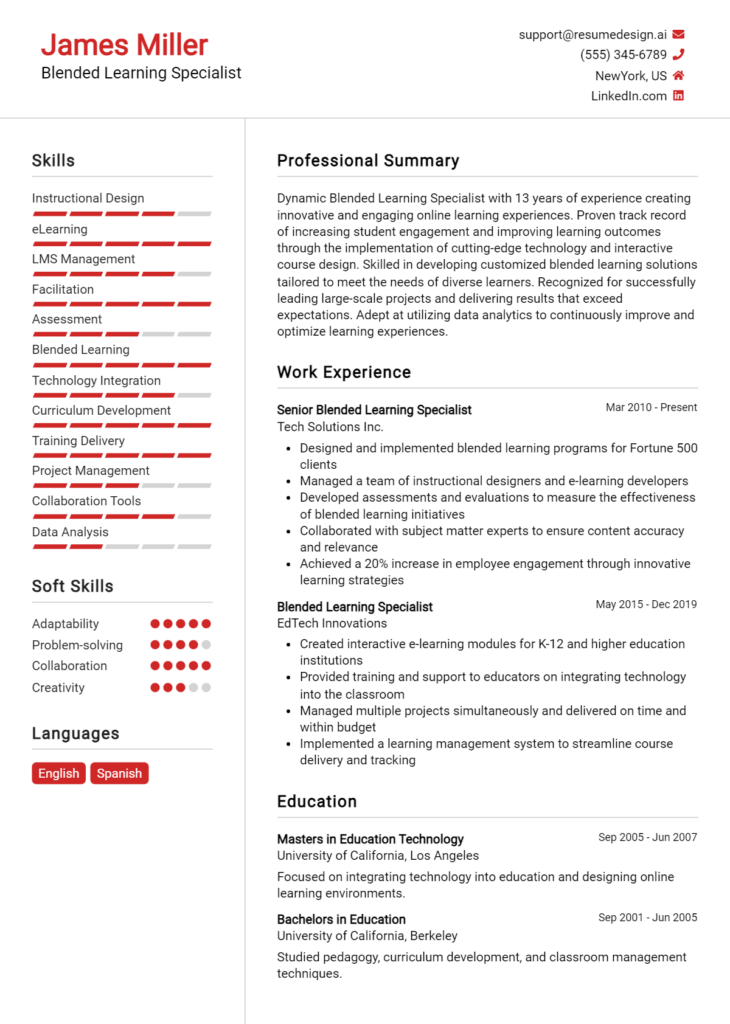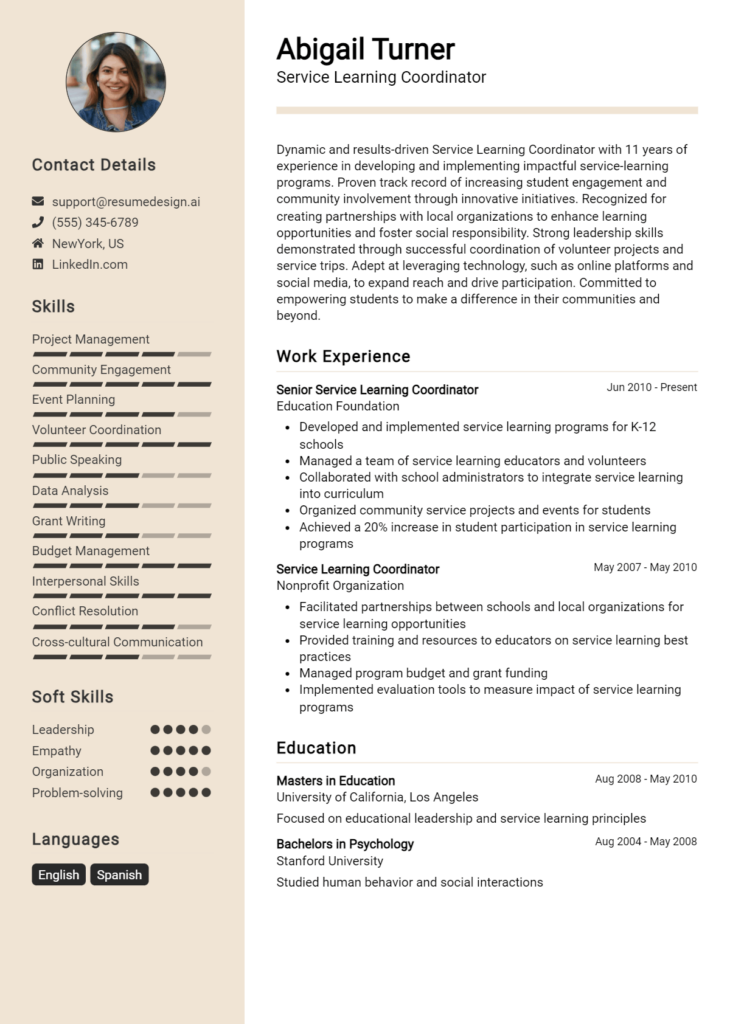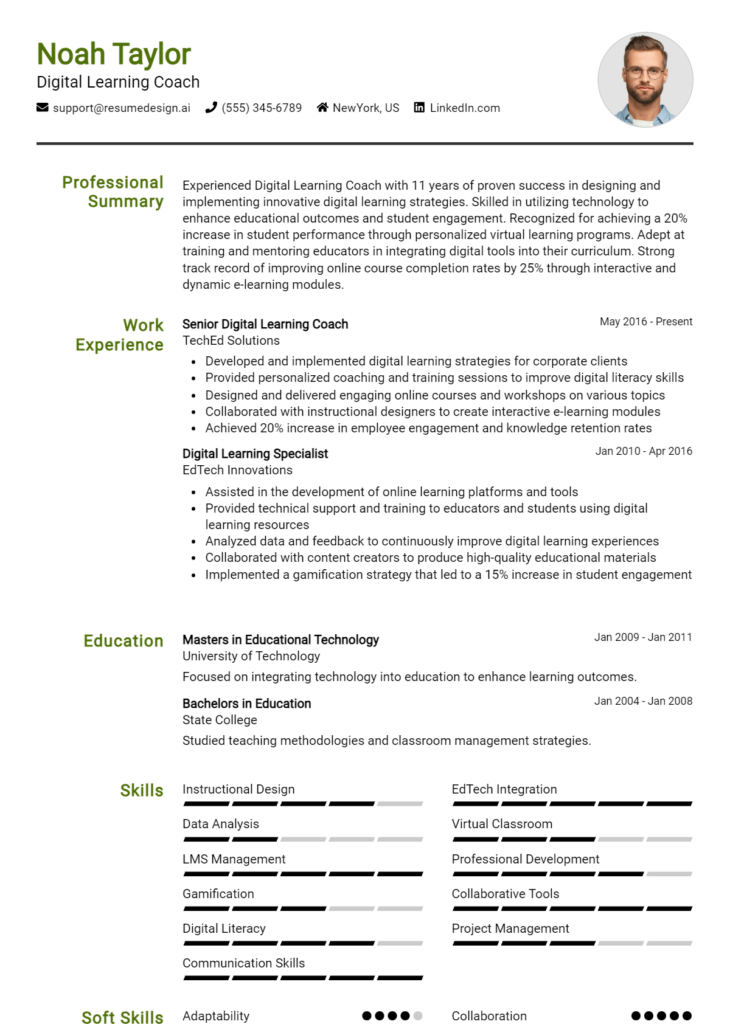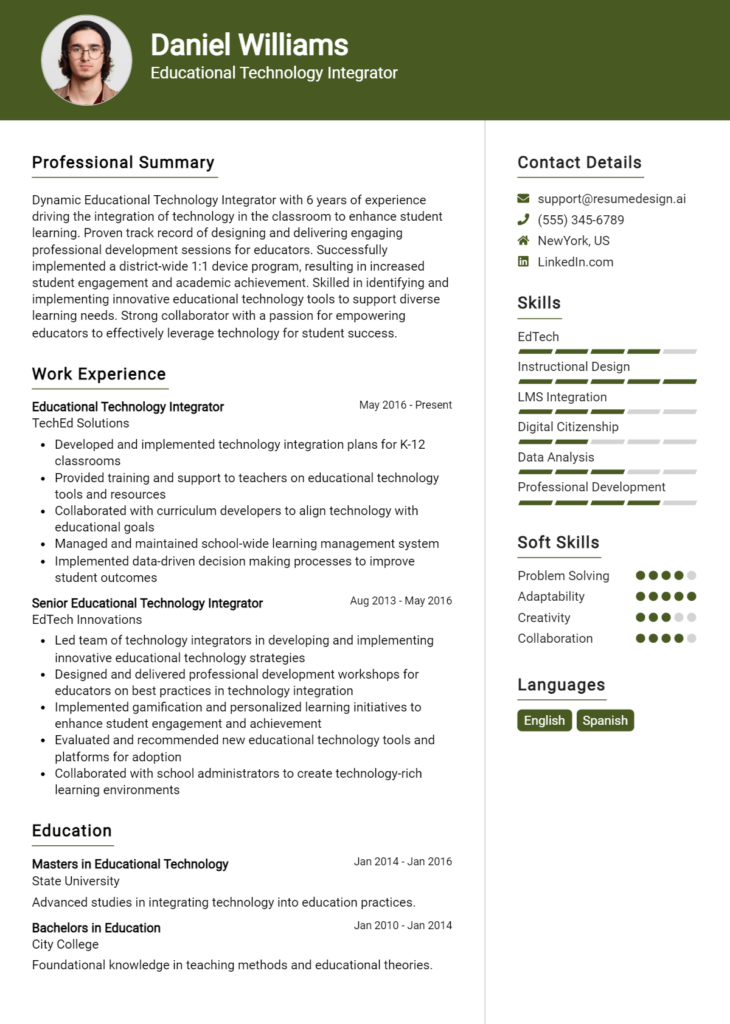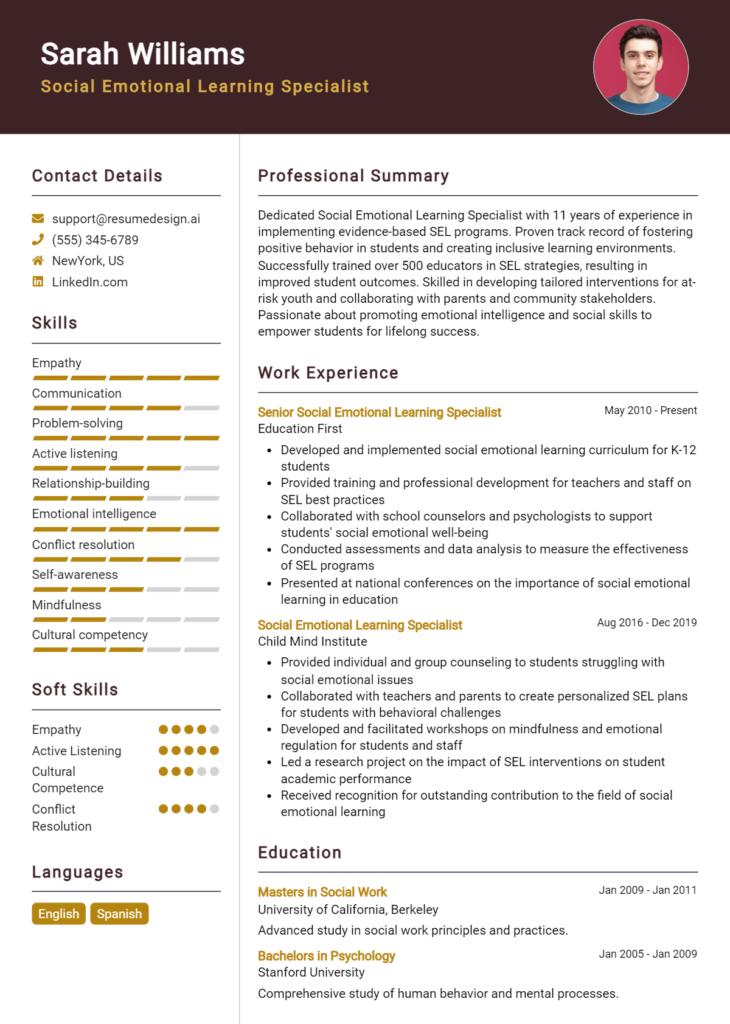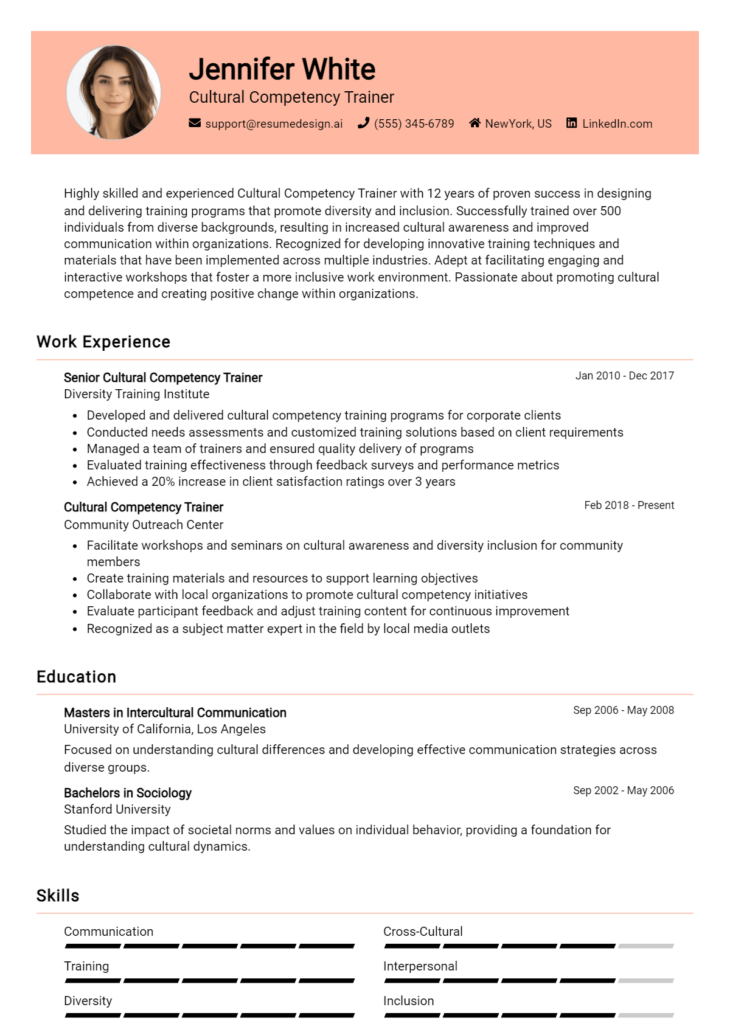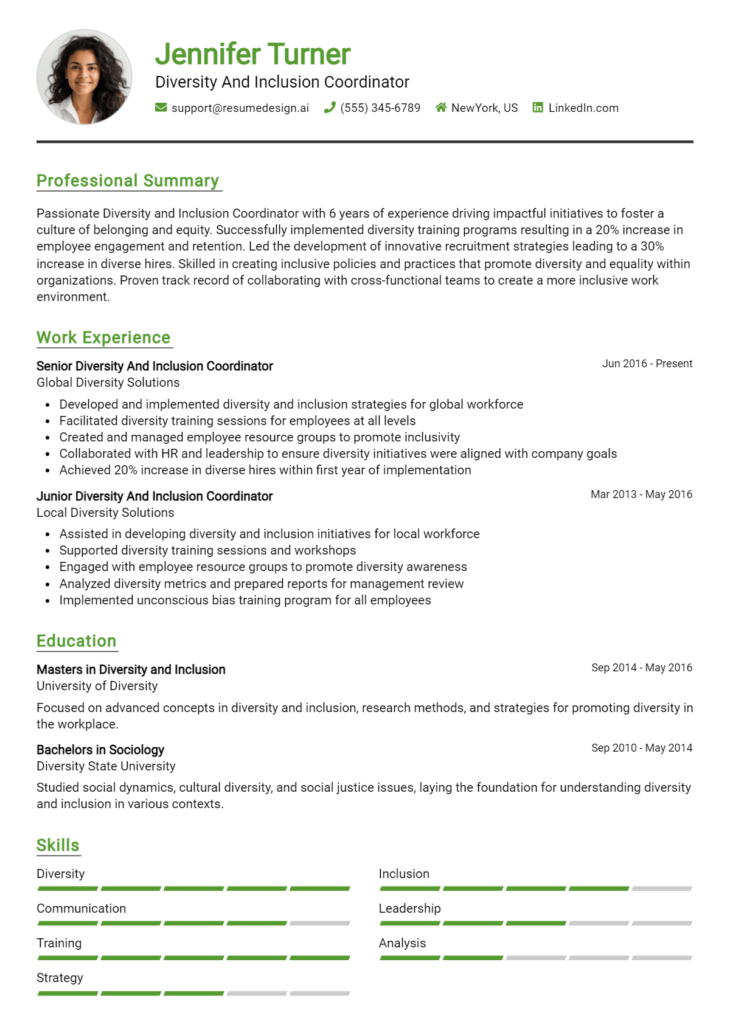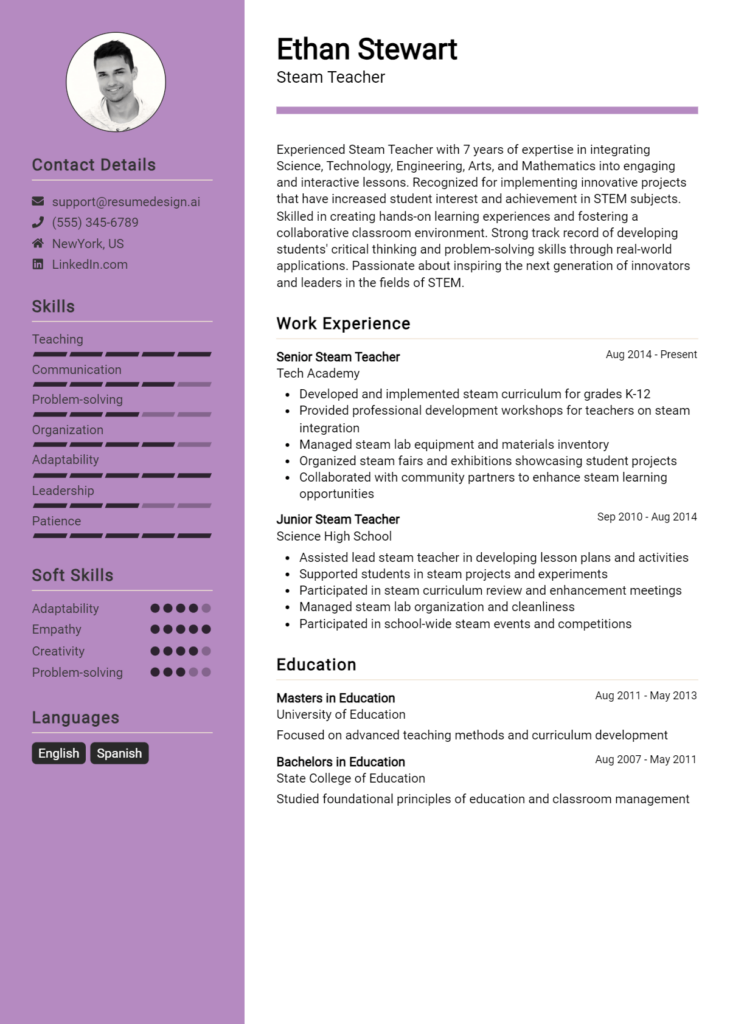Environmental Education Teacher Core Responsibilities
An Environmental Education Teacher plays a crucial role in fostering environmental awareness and stewardship among students. Key responsibilities include developing and implementing engaging curricula that integrate science, ecology, and sustainability, while also collaborating with various departments such as science, art, and community outreach. Essential skills encompass technical knowledge of environmental issues, operational planning for educational activities, and problem-solving abilities to address diverse learning needs. A well-structured resume showcasing these qualifications is vital for contributing to the organization's overarching goals of promoting environmental literacy and responsible citizenship.
Common Responsibilities Listed on Environmental Education Teacher Resume
- Design and deliver comprehensive environmental education programs.
- Conduct hands-on outdoor learning experiences and field trips.
- Assess student understanding and adapt teaching methods accordingly.
- Collaborate with local organizations to enhance educational initiatives.
- Integrate technology and multimedia resources into lesson plans.
- Facilitate workshops and training sessions for educators and community members.
- Develop educational materials and resources focused on sustainability.
- Monitor and evaluate program effectiveness and student engagement.
- Advocate for environmental policies and practices within the school.
- Engage families and the community in environmental awareness events.
- Maintain a safe and inclusive learning environment for all students.
- Stay current with environmental issues and educational best practices.
High-Level Resume Tips for Environmental Education Teacher Professionals
In the competitive field of environmental education, a well-crafted resume is crucial for professionals aiming to make a strong first impression on potential employers. As the first document a hiring manager reviews, your resume serves as a vital tool to showcase your skills, achievements, and passion for environmental stewardship. It needs to reflect not only your qualifications but also your commitment to educating others about sustainability and ecology. This guide will provide practical and actionable resume tips specifically tailored for Environmental Education Teacher professionals, ensuring your application stands out in a crowded job market.
Top Resume Tips for Environmental Education Teacher Professionals
- Tailor your resume to the specific job description by using keywords and phrases from the posting.
- Highlight your relevant experience, including teaching roles, workshops, and community outreach programs.
- Quantify your achievements, such as the number of students engaged or programs developed, to demonstrate impact.
- Showcase industry-specific skills, such as curriculum development, environmental science knowledge, and public speaking.
- Include relevant certifications, such as teaching credentials or specialized training in environmental education.
- Emphasize your ability to collaborate with other educators, community organizations, and stakeholders in environmental initiatives.
- Incorporate volunteer experience that relates to environmental issues or education, showcasing your dedication to the field.
- Utilize a clean, professional format that enhances readability and draws attention to your most significant accomplishments.
- Maintain a concise and focused summary statement at the top of your resume to capture the essence of your qualifications.
By implementing these tips, you will significantly enhance your chances of landing a job in the Environmental Education Teacher field. A polished and targeted resume not only highlights your qualifications but also reflects your enthusiasm for teaching and promoting environmental awareness, making you a compelling candidate for potential employers.
Why Resume Headlines & Titles are Important for Environmental Education Teacher
In the competitive field of environmental education, where passion for nature and teaching skills intersect, a well-crafted resume headline or title plays a crucial role in capturing the attention of hiring managers. A strong headline not only summarizes a candidate's key qualifications but also establishes an immediate connection with the job description, making it easier for employers to discern whether the applicant aligns with their educational goals. Ideally, the headline should be concise, relevant, and directly related to the role of an Environmental Education Teacher, effectively setting the tone for the rest of the resume.
Best Practices for Crafting Resume Headlines for Environmental Education Teacher
- Keep it concise—aim for one impactful sentence or phrase.
- Use keywords relevant to environmental education to align with job postings.
- Highlight specific skills or experiences that set you apart from other candidates.
- Tailor the headline to the specific job title you are applying for.
- Incorporate action verbs to convey a sense of dynamism and engagement.
- Focus on your unique qualifications or achievements in the field of environmental education.
- Avoid jargon; ensure the headline is easily understood by a broad audience.
- Consider including a personal touch that reflects your commitment to environmental issues.
Example Resume Headlines for Environmental Education Teacher
Strong Resume Headlines
Passionate Environmental Education Teacher with 5+ Years of Experience in Curriculum Development
Dynamic Educator Committed to Inspiring Students Through Interactive Environmental Programs
Certified Environmental Educator Specializing in Hands-On Learning and Community Engagement
Innovative Teacher with a Proven Track Record of Empowering Students to Advocate for Sustainability
Weak Resume Headlines
Teacher Looking for a Job
Environmental Educator at Your Service
The strong resume headlines are effective because they are specific, highlight relevant experience, and convey enthusiasm for the role of an Environmental Education Teacher. They provide a clear snapshot of the candidate's qualifications and align closely with the expectations of hiring managers. In contrast, the weak headlines fail to make an impression due to their vagueness and lack of relevant detail, which can leave hiring managers questioning the applicant's suitability for the position.
Writing an Exceptional Environmental Education Teacher Resume Summary
A well-crafted resume summary is a crucial component for an Environmental Education Teacher, as it serves as the first impression for hiring managers. This concise overview quickly communicates the candidate's key skills, relevant experience, and notable accomplishments in the field of environmental education. By capturing the essence of the applicant’s qualifications, a strong summary not only piques interest but also sets the tone for the rest of the resume. It should be impactful, succinct, and tailored to the specific position being applied for, ensuring alignment with the job description and organizational goals.
Best Practices for Writing a Environmental Education Teacher Resume Summary
- Quantify achievements where possible to demonstrate impact (e.g., "Increased student participation in environmental programs by 30%").
- Focus on relevant skills that align with the job description, such as curriculum development or community engagement.
- Tailor the summary for each job application to highlight the most pertinent experiences and qualifications.
- Use action verbs to convey a sense of proactivity and effectiveness (e.g., "Developed," "Implemented," "Facilitated").
- Keep it concise—ideally, no more than 2-4 sentences that pack a punch.
- Highlight specific areas of expertise, such as sustainability education or outdoor learning methodologies.
- Showcase any awards, recognitions, or certifications that enhance credibility in the field.
- Ensure clarity and readability by avoiding jargon and overly complex language.
Example Environmental Education Teacher Resume Summaries
Strong Resume Summaries
Dynamic Environmental Education Teacher with over 5 years of experience in developing innovative curriculum that increased student engagement in sustainability practices by 40%. Proven track record in community outreach, successfully partnering with local organizations to enhance educational programs.
Passionate educator with expertise in outdoor learning and hands-on environmental science instruction, leading to a 25% boost in standardized test scores among students. Skilled in creating immersive experiences that foster a love for nature and stewardship.
Certified Environmental Educator with a Master's in Environmental Science, adept at integrating technology into lessons to enhance understanding of ecological principles. Recognized for spearheading a school-wide recycling initiative that reduced waste by 35% in one year.
Weak Resume Summaries
Experienced teacher looking for a position in environmental education. I have a background in teaching and some knowledge of sustainability.
Dedicated educator with a passion for the environment seeking a role in an educational setting. I believe in teaching students about nature.
The strong resume summaries are considered effective because they include quantifiable results, specific skills relevant to the job, and direct connections to the responsibilities of an Environmental Education Teacher. In contrast, the weak summaries lack detail and specificity, presenting generic statements that do not effectively showcase the candidate’s qualifications or achievements in the field. This contrast underscores the importance of a tailored and impactful resume summary in standing out to hiring managers.
Work Experience Section for Environmental Education Teacher Resume
The work experience section of an Environmental Education Teacher resume is pivotal in demonstrating the candidate's qualifications and suitability for the role. This section not only highlights the candidate's technical skills relevant to environmental education but also showcases their ability to manage teams and deliver high-quality educational programs. By quantifying achievements and aligning work experience with industry standards, candidates can effectively illustrate their impact on student learning and community engagement, making a compelling case for their candidacy in the competitive field of environmental education.
Best Practices for Environmental Education Teacher Work Experience
- Use action verbs to describe your responsibilities and accomplishments.
- Quantify achievements with numbers, percentages, or specific outcomes.
- Highlight technical skills relevant to environmental education, such as curriculum development or data analysis.
- Showcase leadership roles and teamwork experiences to demonstrate collaboration.
- Align work experiences with industry standards and educational frameworks.
- Include relevant certifications or training that enhance your qualifications.
- Focus on experiences that had a measurable impact on students or the community.
- Tailor your work experience descriptions to the specific job you are applying for.
Example Work Experiences for Environmental Education Teacher
Strong Experiences
- Developed and implemented a new environmental science curriculum that increased student engagement by 30% and improved test scores by 15% over two academic years.
- Led a team of 10 educators in a community-based project that resulted in a 50% increase in local student participation in environmental field trips.
- Facilitated workshops for over 200 teachers on integrating sustainability practices into classroom instruction, enhancing their teaching strategies and student outcomes.
- Secured $10,000 in grant funding for an innovative outdoor classroom initiative, which benefited over 500 students in the district.
Weak Experiences
- Taught various subjects to students.
- Participated in some community events related to environmental education.
- Assisted with curriculum development.
- Worked with other teachers on environmental topics.
The examples provided showcase the distinction between strong and weak experiences effectively. Strong experiences are characterized by specific, quantifiable outcomes and demonstrate leadership and collaboration, providing clear evidence of the candidate's impact. In contrast, weak experiences lack detail and assertiveness, presenting vague responsibilities without measurable results, thereby failing to convey the candidate's true capabilities and contributions to the field of environmental education.
Education and Certifications Section for Environmental Education Teacher Resume
The education and certifications section of an Environmental Education Teacher resume is crucial as it showcases the candidate's academic foundation and commitment to the field. This section highlights not only formal degrees but also industry-relevant certifications and ongoing professional development efforts. By including pertinent coursework, specialized training, and certifications, candidates can significantly enhance their credibility, demonstrating their expertise and alignment with the specific requirements of the job role. In an era where environmental awareness and education are increasingly vital, this section serves as a testament to a candidate's dedication to fostering environmental stewardship through education.
Best Practices for Environmental Education Teacher Education and Certifications
- Tailor your education section to include only relevant degrees and courses that support your role as an Environmental Education Teacher.
- Highlight any advanced degrees, such as a Master's in Environmental Education or a related field, to demonstrate higher-level expertise.
- Include industry-recognized certifications, such as those from the National Environmental Education Foundation or similar organizations.
- List specialized training programs or workshops that enhance your skills in effective environmental teaching methodologies.
- Use clear and concise language to describe your educational achievements and certifications, making it easy for employers to assess your qualifications.
- Incorporate relevant coursework that reflects your understanding of environmental science, ecology, and teaching strategies.
- Consider adding dates to your educational qualifications to indicate recent learning and relevancy.
- Showcase any involvement in professional organizations related to environmental education to further emphasize your commitment to the field.
Example Education and Certifications for Environmental Education Teacher
Strong Examples
- M.A. in Environmental Education, University of Environmental Studies, 2021
- Certified Environmental Educator, National Environmental Education Foundation, 2022
- Graduate Certificate in Sustainable Practices, Green Institute, 2020
- Completed coursework in Ecology, Environmental Policy, and Curriculum Development for Environmental Education.
Weak Examples
- B.A. in History, University of Historical Studies, 2015
- Certification in Office Management, Business College, 2019
- High School Diploma, Generic High School, 2010
- Completed a workshop on basic computer skills, 2021.
The strong examples are considered relevant because they directly align with the qualifications needed for an Environmental Education Teacher, showcasing advanced degrees and specific certifications related to environmental education. In contrast, the weak examples lack relevance to the role; they highlight either unrelated fields of study or certifications that do not contribute to the candidate's ability to educate others about environmental issues. This stark difference underscores the importance of targeting education and certifications to the job description and requirements.
Top Skills & Keywords for Environmental Education Teacher Resume
As an Environmental Education Teacher, the skills outlined in your resume are crucial in demonstrating your ability to inspire and educate students about the importance of environmental stewardship. These skills not only highlight your expertise in ecological concepts but also showcase your capability to engage diverse learners in meaningful ways. A strong combination of soft and hard skills can significantly enhance your resume, making it stand out to potential employers and showcasing your commitment to fostering an environmentally conscious mindset in future generations.
Top Hard & Soft Skills for Environmental Education Teacher
Soft Skills
- Excellent communication skills
- Strong interpersonal abilities
- Adaptability and flexibility
- Critical thinking and problem-solving
- Passion for environmental issues
- Empathy and emotional intelligence
- Team collaboration
- Creativity and innovation
- Time management
- Leadership skills
Hard Skills
- Knowledge of environmental science and ecology
- Curriculum development and lesson planning
- Proficiency in educational technology tools
- Field research methodologies
- Experience with outdoor and experiential education
- Familiarity with sustainability practices
- Ability to conduct workshops and seminars
- Data analysis and interpretation
- Grant writing and fundraising strategies
- Knowledge of local wildlife and ecosystems
By incorporating these essential skills into your resume and highlighting relevant work experience, you can effectively illustrate your qualifications for the role of an Environmental Education Teacher and your potential impact on students and the community.
Stand Out with a Winning Environmental Education Teacher Cover Letter
Dear [Hiring Manager's Name],
I am writing to express my enthusiastic interest in the Environmental Education Teacher position at [School/Organization Name], as advertised on [where you found the job listing]. With a strong background in environmental science and a passion for educating young minds about the importance of sustainability, I am excited about the opportunity to inspire students to appreciate and protect our planet. My experience in developing engaging curriculum and hands-on learning experiences aligns perfectly with your mission to foster a deeper understanding of environmental issues among students.
Throughout my career, I have effectively designed and implemented innovative lesson plans that not only meet educational standards but also encourage critical thinking and active participation. For instance, during my time at [Previous School/Organization Name], I spearheaded a community garden project that allowed students to learn about ecosystems, horticulture, and the benefits of local food production. This initiative not only enhanced their understanding of environmental science but also instilled a sense of responsibility and connection to their community. I believe that experiential learning is key in fostering a lifelong commitment to environmental stewardship.
In addition to my teaching experience, I hold a [Degree in Environmental Education/Science] from [University Name], where I developed a solid foundation in both the scientific principles of environmental issues and pedagogical strategies tailored to diverse learning styles. I am particularly drawn to [School/Organization Name] because of your commitment to integrating environmental education across the curriculum and your efforts to engage the community in sustainability initiatives. I am eager to contribute to this vision and collaborate with fellow educators to create an enriching learning environment that empowers students to become informed and active citizens in addressing today’s environmental challenges.
Thank you for considering my application. I look forward to the possibility of discussing how my skills and experiences align with the goals of [School/Organization Name]. I am excited about the opportunity to share my passion for environmental education with your students and help cultivate a generation of environmentally conscious individuals.
Warm regards,
[Your Name]
[Your Phone Number]
[Your Email Address]
Common Mistakes to Avoid in a Environmental Education Teacher Resume
When crafting a resume for the position of Environmental Education Teacher, it’s crucial to present your qualifications and experiences effectively. However, many candidates make common mistakes that can detract from their overall appeal. Understanding these pitfalls can help you create a more compelling and professional resume that aligns with the expectations of employers in the field of environmental education. Here are some common mistakes to avoid:
Generic Objective Statement: Using a vague or generic objective fails to convey your specific interest in environmental education and may not grab the attention of hiring managers.
Neglecting Relevant Experience: Failing to highlight experience in environmental science, teaching, or community engagement can make your resume less relevant. Always prioritize experiences that showcase your qualifications for the role.
Lack of Quantifiable Achievements: Not including quantifiable achievements, such as the number of students taught or successful programs implemented, can make your contributions seem less impactful.
Poor Formatting: A cluttered or inconsistent format can distract from your qualifications. Ensure your resume is clean, organized, and easy to read, using consistent fonts and sizes.
Ignoring Keywords: Many employers use applicant tracking systems (ATS) to filter resumes. Not incorporating relevant keywords from the job description can result in your resume being overlooked.
Overloading with Jargon: While it’s important to demonstrate expertise, using too much technical jargon can alienate those who may not be familiar with the terminology. Aim for clarity and accessibility in your language.
Not Tailoring the Resume: Sending out a one-size-fits-all resume without tailoring it to the specific position can suggest a lack of genuine interest. Customize your resume for each application to reflect how your skills meet the job requirements.
Omitting Professional Development: Leaving out ongoing education, certifications, or workshops related to environmental education can undervalue your commitment to the field. Always include relevant professional development experiences.
Conclusion
As we have explored the vital role of an Environmental Education Teacher, it's clear that this position not only fosters a deep understanding of ecological issues among students but also inspires them to take action towards sustainability. The key competencies highlighted include strong communication skills, a passion for environmental stewardship, and the ability to create engaging, hands-on learning experiences. Furthermore, the importance of collaborating with the community and incorporating local environmental issues into the curriculum has been emphasized as a means to enrich the educational experience.
Now that you have a comprehensive understanding of what makes a successful Environmental Education Teacher, it’s time to reflect on your own qualifications and experiences. Are you ready to showcase your skills effectively? Review your Environmental Education Teacher resume today! Utilize available resources to enhance your job application. Explore resume templates to find a design that suits your style, use the resume builder for a step-by-step guide, and check out resume examples for inspiration. Don’t forget the importance of a strong first impression with a compelling application—consider using cover letter templates to complement your resume. Take action now and elevate your job prospects in the field of environmental education!

